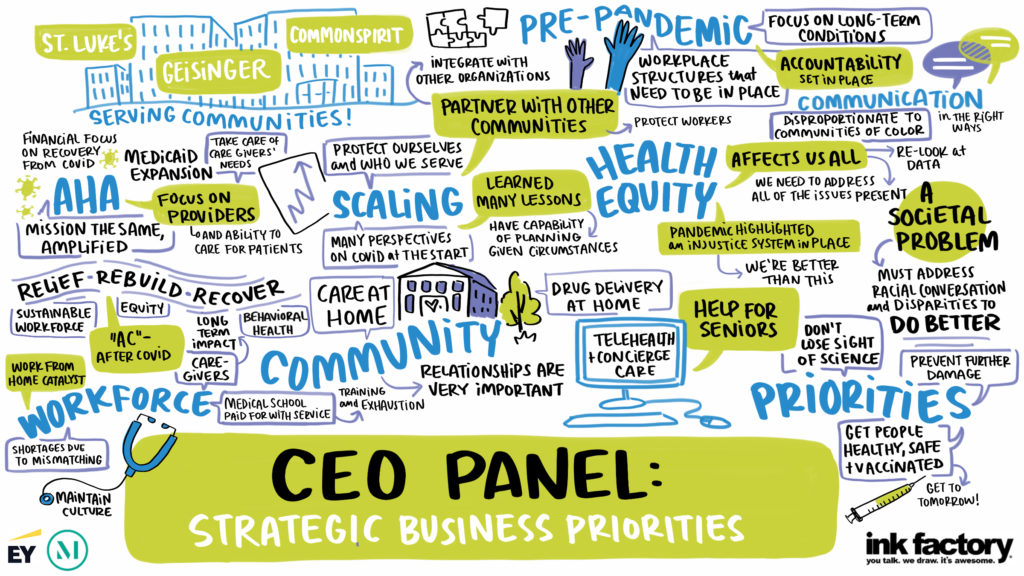Our panel included a discussion on what is ahead for 2021 and how the challenges of COVID-19 will lead to lasting changes for hospitals and health systems, with Lloyd Dean (CEO, CommonSpirit), Melinda Estes, MD (President and CEO, St. Luke’s Health System) and Jaewon Ryu, MD (President and CEO, Geisinger). These top healthcare leaders discussed the short- and long-term impact of COVID-19 on hospitals and health systems and their strategic business priorities in 2021 and beyond with moderator Kerrin Slattery (Partner, McDermott Will & Emery).
Below are the top takeaways for McDermott Will & Emery and EY during the 2021 J.P. Morgan Healthcare Conference: Hospital and Health System CEO Panel: Strategic Business Priorities, click here to access the full webinar.
Access the PDF here.
HOW 2020 PRIORITIES WILL SUSTAIN AND PROVE HELPFUL IN 2021 AND BEYOND
For hospitals and health systems, 2020 began and was primarily focused on issues like cost and payment models, Medicaid expansion and the wellbeing of clinical providers, including physicians, where statistics cite 40% are burned out. SinceCOVID-19, hospitals instantly pivoted to healing their communities and their staff, as well as rejuvenating the delivery system. “I was very pleased to chair a task force on COVID-19 pathways to recovery that produced a dynamic document that has been out for about 5,000 of the hospitals in this field; how do we get back to better business? How do we rebuild? How do we reimagine? So if you’re going to look at what I’ll call “AC”, “after COVID”, the (American Hospital Associations’) priorities are really what I’ll call the three R’s—relief, rebuilding and recovery,” Melinda Estes, MD, president and CEO at St. Luke’s Health System, said.
INVESTMENTS AND STRATEGIES PRE- AND POST-COVID-19
The trust of the community has been instrumental in providing guidance and counsel around the approaches for care and pre-pandemic investments in innovative and patient-centric care models proved critical during the pandemic. Such approaches helped hospital systems tackle care differently and made it easier and efficient for patients. “A couple of examples of programs we’ve invested in over the last several years, one has been something we call the ‘Geisinger At Home Program,’ where we take the sickest 3% to 5% of our patients and deliver the care and move services into the home. And when we did this, we found that their [emergency room] use rate dropped by about 40% and their hospital use rate dropped by about 25%,” Jaewon Ryu, MD, president and CEO at Geisinger, said. “Another example is our mail-order pharmacy, where we’ve seen 37% higher medication adherence rates in that program; being able to continue to deliver drugs and get them into the hands of those who need them during this pandemic was instrumental.” Post-COVID, such patient centered approaches will necessarily expand.
IMPROVING HEALTH EQUITY IN COMMUNITIES OF COLOR
COVID-19 exposed an endless number of issues with the health care delivery system and shone a light on the lack of health equity within communities of color. While hospital systems have already invested in improving health equity, there is recognition that there is much more work to do, and such work needs to focus on specific strategies and programs that are reflective of the community, in concert with other organizations., With the development of best practices and data outcomes, additional opportunities could be explored across communities. “We know that in communities of color, having physicians and caregivers that look like the demographic of the community improves care, improves access and that’s just a way of saying that it takes all of us, Lloyd Dean, CEO at CommonSpirit, said. “We’ve also seen that without having a fair and just system in place, (with) accessible care, quality care for all, that it has a dramatic effect on certain groups in segments of our society,” he continued.
THE IMPACT ON THE WORKFORCE IN LOCAL COMMUNITIES
COVID-19 catalyzed the movement toward work from home for those that were able to do it, but it also created workforce shortages for hospitals and health systems. Taking care of caregivers, who have resiliently made sacrifices to work during the pandemic, will continue to impact the future. Caregivers in hospitals and health systems are experiencing exhaustion as well as other hardships. “How do we relieve them of that [exhaustion]? We have to take some of the other burdens off of them in that it is a perfect storm when you have to worry about employment, you have to worry about how do I educate my child. Our responsibility as an employer, I think we are called to revisit those and to revisit those with our caregivers and our employees. I think all of those kinds of things when we think about workforce training, where work is delivered, how it’s being delivered, what’s the role of technology are all on the table,” Lloyd Dean said.
For the large non-clinical workforce of hospitals and health systems, there remain similar issues. “Will a large number of folks stay working remotely? It raises a number of other issues as we pivot toward that. One is just giving our managers the tools and skills to manage a little more remote workforce. The second is how do we maintain our culture? How do we maintain connection with that remote workforce,” Melinda Estes, MD, said.
To catch up on all of the sessions at the McDermott Will & Emery and EY during the 2021 J.P. Morgan Healthcare Conference, please click here.







